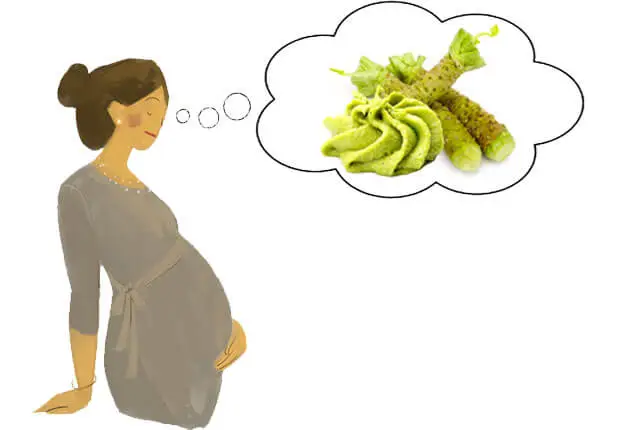This article highlights the benefits, recommendations, safety, and potential side effects of eating wasabi during pregnancy. Can pregnant women eat wasabi? Is it safe?

Wasabi is a common Japanese condiment served with sushi, sashimi, and other Japanese foods. It has a spicy taste that can make your eyes water and your sinuses clear.
Wasabi is made from the root of a Japanese horseradish called Wasabia Japonica, grated into a fine paste.
Genuine wasabi has bright green color and a sharp flavor. It is rare and hard to find. Real wasabi is also rather pricey because of the difficulty of growing the plant and its labor-intensive preparation method.
As a result, many commercially marketed wasabi products include horseradish, mustard, and food coloring. These goods may be called “wasabi” or “wasabi paste,” but they lack the flavor and aroma of genuine wasabi. Luckily they are a better choice for pregnant women!
So, is wasabi safe for pregnant women? Let’s explore this question in-depth.
Is wasabi safe for pregnant women?
There is no scientific study about eating wasabi during pregnancy yet, meaning it hasn’t been scientifically proven to be safe or harmful for pregnant mothers.
Based on practical experience and what is known, most healthcare providers advise pregnant women to avoid eating high amounts of wasabi.
Eating wasabi in moderation during pregnancy is generally considered safe, but consuming excessive amounts of wasabi could be dangerous.
Wasabi has a high allyl isothiocyanate concentration, which gives it its characteristic flavor and scent. Consuming too much allyl isothiocyanate can irritate the nasal passages and throat. It can also cause pain and shortness of breath.
According to some data, consuming a lot of wasabi while pregnant may raise the chance of early labor or miscarriage. But until now, they have done the research only on animals, so there is no scientific proof that the results also apply to people.
Regardless of the absence of studies, it is always best to be cautious regarding your and your unborn baby’s health. So, if you are pregnant, avoid eating a lot of wasabi or other hot or spicy foods.
If you wish to eat wasabi with your sushi, do so in moderation! However, this brings us to another important question:
Is sushi even safe for pregnant women?
If you’re eating wasabi because of sushi, you should first check if the sushi you eat is safe for pregnant women. You can find everything about eating sushi during pregnancy posted here.
Alternatives to Wasabi
If you like sushi and want to eat it while pregnant but are concerned about the safety of wasabi, you can try an alternative.
As I said in the introduction, many stores and sushi places serve mild wasabi made with horseradish, mustard, and food coloring. This substitute tastes similar to wasabi but is less intense and spicy. Most importantly, it is safer for pregnant women!
Another option is pickled ginger, which is also commonly served with sushi. Pickled ginger has a sweet and tart flavor and even assists your digestion. It is safe to consume while pregnant and can offer a new dimension of taste to your sushi.
Potential risks of eating wasabi during pregnancy
Excessive consumption of wasabi or other spicy foods during pregnancy may cause discomfort and raise the risk of some health problems.
Potential health risks of eating too much wasabi during pregnancy:
1. Digestive problems:
Spicy meals can irritate your digestive system, creating heartburn, acid reflux, and other digestive issues that are already common during pregnancy.
2. Wasabi can cause allergic reactions:
Some people are allergic to wasabi, which causes rashes, itching, and difficulty breathing. If you encounter any of these symptoms, seek medical attention right once.
3. Blood thinning:
According to certain studies, the compounds found in wasabi, known as allyl isothiocyanate, may have blood-thinning characteristics. Thus eating too much wasabi during pregnancy may increase the risk of bleeding or interfere with blood-thinning medications.
4. Miscarriage:
According to certain studies, taking large amounts of wasabi while pregnant may increase the chance of preterm labor or miscarriage.
Talking to a healthcare provider or registered dietitian about dietary concerns, including wasabi during pregnancy, is always a good idea.
